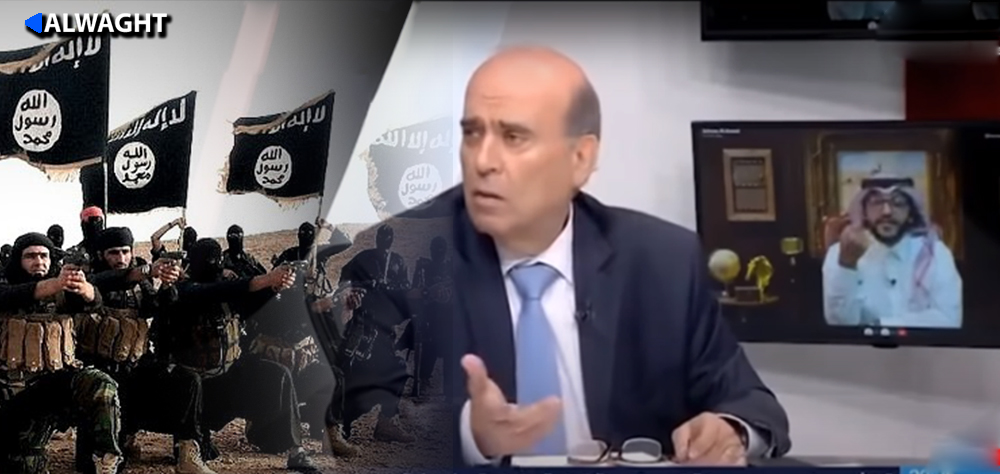Alwaght- An interview of the Lebanese Foreign Minister Charbel Wehbe with the US Arabic-language Alhurra news channel ignited new tensions between Beirut and Riyadh. Responding to biased questions about the arms of Hezbollah, Wahbe defended the role of the resistant Lebanese movement in the face of the Israeli expansionism and militarism, and at the same time lashed out at Arab countries, which he ironically called “friends”, for their sponsoring of ISIS terrorist group emergence.
“The brotherly and friendly countries created ISIS, funded it, and spread it to Nineveh, Al-Anbar, and Palmyra,” he asserted.
The most important part was the unprofessional and out-of-official-protocols move of the American network’s invitation of a Saudi political analyst and allowing him to insult the top Lebanese diplomat. In response, Wahbe put his hand on the weak spot of the Saudi foreign policy, saying that “those who killed and dismembered Jamal Khashoggi have no right to speak that way,” referring to the vocal critical of the Saudi Crown Prince Mohammed bin Salman who was assassinated at the Saudi embassy in Istanbul in October 2018 by a hit squad sent by the prince.
The FM’s comments get widespread reflection inside Lebanon
Al-Wahbe’s remarks stirred a wave of reactions inside Lebanon. In a statement, Lebanese President Michel Aoun denounced the comments, saying: "Wahbe's remarks are his personal opinion and are not Lebanon's position at all, and I oppose any remarks insulting the brotherly and friendly countries, including Saudi Arabia, especially the [Persian] Gulf countries."
Aoun further emphasized the depth of brotherly relations between Lebanon and the Persian Gulf countries, led by Saudi Arabia and Beirut's desire to continue and strengthen these relations in all fields, and said: "Some of Wahbe's words provoked reactions and political stances whose main goal is to disrupt relations between Lebanon and its Arab brothers.”
On Tuesday, the FM apologized for the comments, saying that he did not mean to bother the Arab states and that his comments were taken mistakenly.
Caretaker Lebanese Prime Minister Hassan Diab said he had asked Wahbe for an explanation, adding that his country was eager to maintain "best relations" with Saudi Arabia and the other Persian Gulf monarchies.
The prime minister-designate Saad Hariri who owes his much of his wealth to Saudi Arabia severely criticized the comments, saying they were not “accordant with the diplomatic norms.”
(Persian) Gulf Cooperation Council members’ reactions
Critical comments also came from members of the Cooperation Council.
Saudi Arabia summoned the Lebanese ambassador to Riyadh on Tuesday to protest "insulting remarks” by its foreign minister.
In a statement, the Saudi Foreign Ministry strongly condemned Wahbe's "insulting" remarks, saying "they are against the simplest diplomatic norms."
In a separate statement, Nayef al-Hijraf, secretary general of the (Persian) Gulf Cooperation Council, called for Wahbe to formally apologize to the Arab states for his "unacceptable" remarks.
The Kuwaiti Foreign Ministry also summoned the Lebanese embassy charge d'affaires in a statement on Tuesday to deliver an official note protesting "insulting" comments. The UAE and Bahrain have taken similar steps.
“The remarks against the Persian Gulf states were "shameful and racist," said a statement by the UAE.
A Bahraini statement said that the remarks were against diplomatic principles and harming to the “brotherly relations” of the two countries.
Lebanon harmed by foreign crisis making
Saudi Arabia and Lebanon have experienced tense relations in recent years. Riyadh has always considered itself one of the influential actors in the developments in Lebanon and has close relations with some Lebanese political factions. But with Hezbollah gaining more and more political, military, cultural and economic power in the geo-strategically important nation, Riyadh has replaced the supportive approach of the past with a tendency to cut off support and create crises. Lebanon's diverse and mosaic society in terms of identity and the existence of a quota-based power-sharing mechanism in the constitution have potentials for political instability, paving ground for actors in recent years for such anti-Hezbollah countries as Saudi Arabia to perpetuate the crisis cycle in Lebanon.
While the economic crisis of recent years has made Lebanon one of the most indebted countries in the world, and living conditions have been severely impacted by inflation, the devaluation of the national currency and the inability of banks to repay people's deposits, the political crisis caused by the Saudi pressures on the Lebanese political groups to avoid coalition with Hezbollah in the cabinet formation made the political crisis adding to the economic crisis.
Last month, Saudi Arabia banned fruits imports from Lebanon under the excuse of drugs smuggling into the kingdom and at the same time pressed the Iraqi government to cancel hosting the Lebanese PM Diab as Beirut and Baghdad were to discuss cooperation to help face common crises. The move dealt a blow to Diab’s push to settle the devastating economic crisis the country has been facing for over a year.
With all the unjustified Saudi interference in the Lebanese internal affairs, the FM’s comments can be said to reflect the scale of the negative Lebanon public view of the Saudi interventions.



























